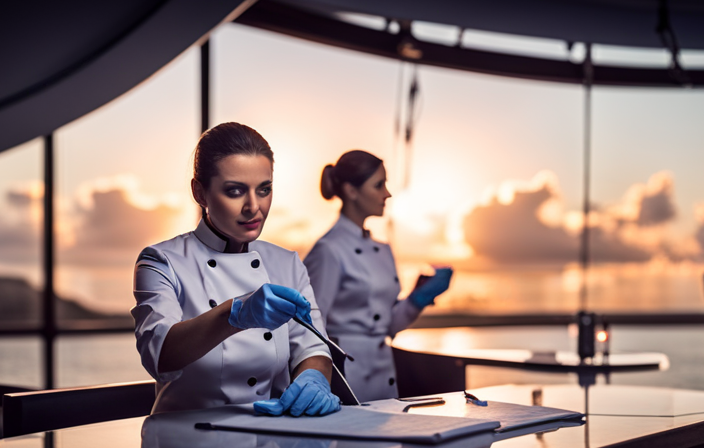Similar to how a skilled captain navigates a ship through treacherous seas, evading norovirus on a cruise necessitates meticulous planning and preventive measures. Having suffered from the disagreeable symptoms of norovirus firsthand, I’ve grasped the significance of implementing measures to safeguard not only yourself but also your fellow passengers from this extremely infectious disease. In this article, my goal is to provide you with effective advice and tactics to guarantee your health and enhance your enjoyment of the cruise.
By understanding the symptoms and transmission of norovirus, practicing proper hand hygiene, and avoiding touching your face, you can significantly reduce the risk of contracting and spreading this virus.
Additionally, using hand sanitizer frequently, taking precautions when dining and using shared facilities, and staying hydrated can further safeguard your well-being on board.
It is also crucial to avoid close contact with sick passengers and follow the cruise ship’s guidelines and recommendations.
With these evidence-based strategies in place, you can enjoy your cruise worry-free, knowing that you have taken proactive steps to prevent norovirus. Remember, prevention is always better than cure, especially when it comes to protecting yourself and others from the unpleasant effects of this illness.
Key Takeaways
- Avoid close contact with sick passengers to reduce the spread of norovirus.
- Follow the cruise ship’s guidelines and recommendations to ensure a safe and healthy experience.
- Seek medical attention if experiencing symptoms of norovirus, and inform medical staff about symptoms and activities.
- Maintain proper hygiene practices, such as regular handwashing and avoiding contaminated food and water.
Understand the Symptoms and Transmission of Norovirus
Alright, let’s break it down and understand what symptoms to look out for and how norovirus spreads on a cruise ship!
Norovirus is highly contagious and can be transmitted through various modes such as direct contact with an infected person, consuming contaminated food or water, or touching contaminated surfaces.
Common symptoms of norovirus include nausea, vomiting, diarrhea, stomach cramps, and fever. These symptoms usually appear within 12-48 hours after exposure and can last for 1-3 days.
It is important to note that some infected individuals may not show any symptoms but can still spread the virus.
Now that we know how norovirus spreads, let’s move on to the next section, which focuses on practicing proper hand hygiene to prevent its transmission.
Practice Proper Hand Hygiene
To practice proper hand hygiene on board, follow these steps:
-
Regularly wash your hands with soap and water. This is essential for keeping your hands germ-free and healthy.
-
Use proper handwashing techniques to prevent the spread of norovirus. Lather your hands with soap for at least 20 seconds, making sure to cover all surfaces, including the backs of your hands, between your fingers, and under your nails.
-
Rinse your hands thoroughly with running water.
-
Dry your hands with a clean towel or air dryer. It’s important to dry your hands properly to prevent the growth of bacteria.
Remember, using soap is crucial as it helps remove the virus from your hands effectively. Water alone may not be as effective in killing germs.
By practicing proper hand hygiene, you can significantly reduce the risk of norovirus transmission on a cruise. This not only protects yourself but also others from getting sick.
Additionally, remember to avoid touching your face as another crucial step in preventing the spread of norovirus.
Avoid Touching Your Face
By refraining from touching your face, you can reduce the risk of transferring germs and keep yourself healthier while on board. Norovirus can easily spread from contaminated surfaces to your hands, and then to your face, increasing your chances of getting sick.
Touching your face, especially your eyes, nose, and mouth, provides a direct pathway for the virus to enter your body. To prevent face touching, try to be conscious of this habit and make a conscious effort to avoid touching your face. You can use distractions like fidget toys or simply be mindful of where your hands are.
In addition, keeping your hands clean by washing them frequently or using hand sanitizer can further reduce your exposure to norovirus. By following these preventive measures, you can minimize the risk of getting sick on a cruise.
Use Hand Sanitizer Frequently
Safely sanitize your hands frequently aboard the ship to keep the spread of germs at bay. Hand sanitizer alternatives can be used if you don’t have access to traditional hand sanitizer. These alternatives include rubbing alcohol with at least 60% alcohol content and sanitizing wipes that contain alcohol.
However, it’s important to note that hand sanitizers are generally effective in killing most types of germs, including norovirus. Studies have shown that hand sanitizers with an alcohol content of at least 60% can effectively reduce the number of norovirus particles on hands. So, using hand sanitizer frequently can significantly reduce the risk of contracting norovirus on a cruise.
By taking this simple precaution, you can enjoy your cruise experience without worrying about falling ill. When dining and using shared facilities, it is important to take additional precautions to prevent the spread of norovirus.
Take Precautions when Dining and Using Shared Facilities
When enjoying meals and using shared spaces, it’s crucial to be cautious and mindful of hygiene practices. Preventing contamination is essential in preventing the spread of norovirus on a cruise.
To ensure food safety measures, wash your hands thoroughly before and after meals, and use hand sanitizer frequently. Avoid touching your face, as this can transfer germs from surfaces to your mouth or eyes. When dining, choose cooked foods over raw dishes and avoid buffet-style dining if possible.
Additionally, be cautious when using shared facilities, such as public restrooms and fitness centers. Use disposable paper towels to open doors and avoid direct contact with surfaces.
By following these precautions, you can reduce the risk of norovirus transmission on a cruise.
Transitioning into the next section, it’s also important to clean and disinfect your cabin regularly.
Clean and Disinfect Your Cabin Regularly
After taking precautions when dining and using shared facilities on a cruise, it is equally important to prioritize the cleanliness and disinfection of your cabin. Cabin maintenance plays a crucial role in preventing the spread of norovirus.
Regularly cleaning and disinfecting high-touch surfaces such as doorknobs, light switches, and remote controls can significantly reduce the risk of contamination. Using disinfectant wipes or sprays that are effective against norovirus is recommended.
Additionally, washing your hands thoroughly with soap and water before and after cleaning your cabin is essential. Maintaining good hygiene practices in your living space can help create a safe and healthy environment during your cruise.
By ensuring proper cabin maintenance and following recommended disinfection procedures, you can minimize the chances of contracting norovirus.
Transitioning into the next section, it is also important to stay hydrated and maintain a healthy diet while on a cruise.
Stay Hydrated and Maintain a Healthy Diet
To keep yourself in shipshape during your voyage, make sure to stay hydrated and eat a balanced diet.
Maintaining proper hydration is crucial to prevent norovirus and other illnesses on a cruise. Drink plenty of water throughout the day, especially when engaging in physical activities or spending time in the sun.
Eating a healthy diet rich in fruits, vegetables, and whole grains will provide your body with essential nutrients and strengthen your immune system.
Additionally, it is important to stick to your exercise routines while on the cruise. Engaging in regular physical activity can boost your immune system and help prevent illness.
Recognize the importance of sleep and rest as well, as a well-rested body is better equipped to fight off infections.
By staying hydrated, eating a balanced diet, and maintaining exercise and sleep routines, you can significantly reduce your risk of contracting norovirus or other illnesses on a cruise. It is crucial to prioritize your health and well-being during your trip.
Transitioning into the next section, avoiding close contact with sick passengers is another important measure to prevent the spread of norovirus.
Avoid Close Contact with Sick Passengers
Avoid getting too close to passengers who are sick, as this can help in reducing the spread of illnesses on the ship. Maintaining a safe distance is crucial, especially when it comes to preventing the transmission of norovirus. To further emphasize the importance of this preventive measure, let’s take a look at cruise ship entertainment and safety procedures.
| Cruise Ship Entertainment | Understanding Cruise Ship Safety Procedures |
|---|---|
| Live shows | Mandatory safety drills |
| Onboard activities | Emergency evacuation plans |
| Casino games | Medical facilities and staff |
| Sports facilities | Sanitation protocols |
Cruise ships offer a wide range of entertainment options to keep passengers entertained throughout their journey. However, it’s crucial to remember that maintaining a safe distance from sick individuals is essential. Understanding and following cruise ship safety procedures, such as participating in mandatory safety drills and familiarizing oneself with emergency evacuation plans, can also contribute to a safe and healthy cruise experience. Moving forward, it is important to follow the cruise ship’s guidelines and recommendations to ensure the well-being of everyone on board.
Follow the Cruise Ship’s Guidelines and Recommendations
By adhering to the cruise ship’s guidelines and recommendations, passengers can ensure a smooth and enjoyable journey that surpasses their wildest expectations.
Cruise ships offer a wide range of amenities and entertainment options to keep passengers entertained throughout their trip. From luxurious spas and fitness centers to captivating live shows and thrilling casinos, there is something for everyone on board.
The cruise ship’s guidelines provide valuable information on how to make the most of these amenities and ensure a safe and enjoyable experience for all passengers. Following these guidelines will not only help prevent the spread of norovirus but also enhance the overall experience on the cruise.
So, whether you’re indulging in a rejuvenating spa treatment or enjoying a night of live entertainment, remember to follow the cruise ship’s guidelines to make the most of your journey.
Seek medical attention if you experience symptoms of norovirus to ensure your well-being and the well-being of others.
Seek Medical Attention if You Experience Symptoms of Norovirus
If you start feeling sick on the ship, make sure to seek medical attention right away to ensure you get the care you need.
Seeking medical attention is crucial if you experience symptoms of norovirus. Some common symptoms include nausea, vomiting, diarrhea, stomach cramps, and fever.
It is important to remember that these symptoms can also be caused by other illnesses, but it’s better to be safe and get checked by a medical professional. They can provide a proper diagnosis and recommend the necessary treatment.
Additionally, seeking medical attention promptly can help prevent the spread of norovirus to other passengers and crew members.
Remember to inform the medical staff about your symptoms and any recent activities or food consumption that may have contributed to your illness.
Frequently Asked Questions
Can I still get norovirus if I practice proper hand hygiene?
Proper hand hygiene is essential in preventing norovirus, but it’s not foolproof. Norovirus can spread through multiple routes, including contaminated surfaces and food. So, even with good hand hygiene, there’s still a risk of contracting norovirus.
How long does it take for norovirus symptoms to appear after exposure?
The incubation period for norovirus is usually 12 to 48 hours after exposure. Early signs of norovirus infection include nausea, vomiting, diarrhea, and stomach cramps. It’s important to stay hydrated and practice good hygiene to prevent the spread of the virus.
Is it safe to use the cruise ship’s shared facilities, such as the gym or pool?
I wouldn’t jump into the cruise ship’s shared facilities without considering the cruise ship’s sanitation practices. It’s important to ensure they have proper cleaning protocols in place to reduce the risk of norovirus transmission.
What should I do if I suspect someone on the cruise ship has norovirus?
If I suspect someone on the cruise ship has norovirus, I would immediately report it to the ship’s staff. They have specific protocols in place to handle suspected cases and prevent the spread of the virus.
Can I get norovirus from food prepared by the cruise ship’s kitchen staff?
Sure, I can get norovirus from the food prepared by the cruise ship’s kitchen staff. It’s hilarious how their "food safety" and "cruise ship sanitation" measures don’t seem to prevent outbreaks.
Conclusion
In conclusion, preventing norovirus on a cruise requires diligence and adherence to proper hygiene practices. By washing hands frequently, avoiding touching our faces, and using hand sanitizer, we can minimize the risk of transmission.
Following guidelines and recommendations from the cruise ship also plays a significant role in preventing the spread of the virus.
Just as a lighthouse guides ships safely to shore, these precautions act as beacons of protection, ensuring a healthy and enjoyable cruise experience for all passengers.
Stay vigilant, stay informed, and may your journey be smooth and illness-free.










